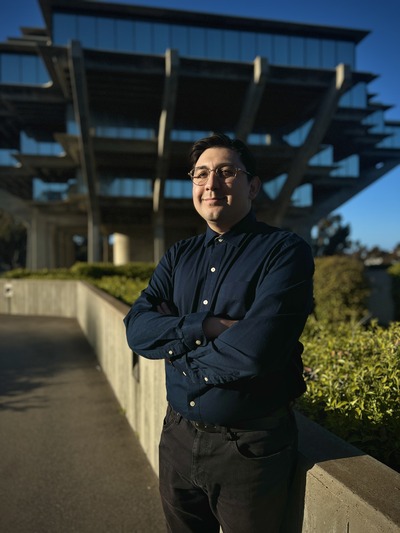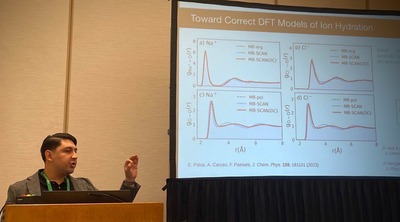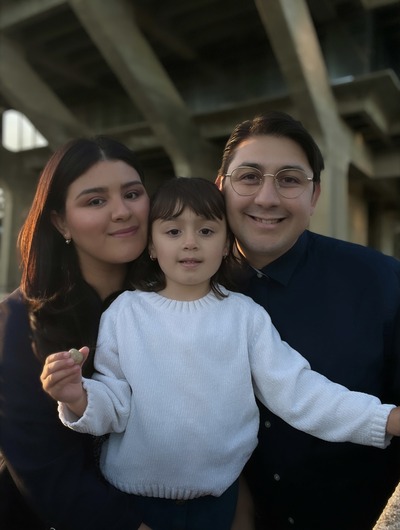Meet Ph.D. Student Etienne Palos: First-Generation Chemistry Trailblazer
Story by:
Published Date
Article Content
Etienne Palos is a fourth year UC San Diego Ph.D. student specializing in theoretical and computational chemistry in the lab of Francesco Paesani. Palos—whose passion and perspective is shaped by his upbringing on both sides of the U.S.-Mexican border—will soon take his academic journey abroad to Germany and Switzerland.
Palos is one of 27 young scientists elected as part of the 2024 class of UC President’s Lindau Nobel Laureate Meetings Fellows. This June, the group of accomplished scientists will head to Germany to meet with Nobel laureates from around the globe. Then in September, Palos will travel to Switzerland to pursue his studies as a ThinkSwiss Fellow, a prestigious scholarship program that supports research and academic exchange between the United States and Switzerland.

Ahead of his travels, the inspiring first-generation graduate student discusses his background, his experience as a Latinx student in STEM and more.
Interview has been edited slightly for brevity and clarity.
Can you share a bit about your background and where you grew up?
I grew up on both sides of the Mexico and U.S. border. I was born in San Diego, but my family and I moved around a lot between Southern California and Tijuana, Baja California.
I'm Mexican-American and have always identified as a Chicano. However, I do consider myself more of a Tijuanense than a San Diegan. I am also a first-generation graduate. My parents did not have the opportunity to go to college—my mom and dad still cross the border every day to work and support the family.
Can you tell me about your path to UC San Diego?
As a kid, I was always interested in UC San Diego. However, I decided to pursue my undergraduate education in Mexico and studied at the Universidad Nacional Autónoma de México (UNAM). Since I was interested in chemistry, physics, and mathematics, I majored in nanotechnology.
I had the opportunity to pursue my studies at the UNAM Ensenada's Center for Nanoscience and Nanotechnology. While at UNAM, I started research with tight-binding models and later moved on to density functional theory, which set the stage for my current work as a graduate student. My Ph.D. involves understanding the strengths and limitations of electronic structure methods, using data-driven and machine learning approaches to connect to other theories in physical chemistry.

What inspired you to pursue chemistry?
In high school, I realized that I wanted to be a scientist, but I didn't know exactly what field I wanted to pursue. It became clear to me that I wanted to understand matter at the atomic and molecular scale—there was something captivating about nanotechnology, quantum mechanics and chemical physics. Understanding how matter interacts and arranges itself at such a small scale, and knowing that these unseen interactions predetermine everything we observe in the macroscopic world, was fascinating to me.
Can you talk about your upcoming academic pursuits abroad?
I've been selected as one of UC President’s Lindau Nobel Laureate Meetings Fellows. I'm really excited about attending the 2024 Lindau Nobel Laureate Meeting in Germany. This will be my first time in Europe.
Afterwards, I will head to Switzerland as a ThinkSwiss Research Fellow where I will be working with Professor Stefan Vučković at the University of Fribourg. I’m also excited to be bringing my wife and my daughter with me to Switzerland—I showed my daughter some photos and she thinks it looks like the kingdom of Arendalle from the movie Frozen!
Is there someone who has made a significant impact on your life?
My wife and our daughter have been crucial. My wife and I started dating when we were 15, and we've been together ever since. We went to different universities in different cities, maintaining a long-distance relationship through college. Now that I'm focusing on my Ph.D. at UC San Diego, we live here and have started a family of our own.

Has there been anyone you’ve met at UC San Diego that has shaped your academic journey?
One person I'd like to mention is Adrian Jinich, an assistant professor at the Skaggs School of Pharmacy and Pharmaceutical Sciences's Department of Chemistry & Biochemistry. I first met him when he was a Ph.D. student at a workshop I attended in Mexico as a high school student. It was there that he explained theoretical and computational chemistry to me, detailing its various aspects like quantum chemistry and molecular dynamics. Being Mexican himself, Jinich had a significant influence on me.
At the same workshop, I also met Joel Yuen-Zhou, an associate professor of chemistry and biochemistry. Meeting these two Mexican theoretical chemists was eye-opening for me. They gave me the hope and confidence to apply to go to college at UNAM, even if it was a scary thing to do.
Finally, Francesco Paesani, who has been one of my greatest advocates and role models in science since we met when I was a senior at UNAM. From Paesani, I have learned to approach scientific problems with a combination of confidence, creativity and importantly, rigor. His dedication to research and mentorship has greatly influenced my own work ethic and my understanding of my passion as a scientist.
Can you talk about your experience as a Latinx individual in STEM?
If you are Latinx student entering STEM, representation definitely matters. I think all of us deal with imposter syndrome—I was filled with doubt and questioned whether people like me could get into this field. However, meeting people from similar backgrounds who were already involved in research that intrigued me boosted my confidence. Once I understood that the probability of success wasn't zero, it motivated me to work even harder.
What guidance would you offer to fellow Latinx students aspiring to pursue graduate studies?
Work hard and try to be adaptive—the world is constantly changing and we must change with it.
Something that I also believe is deeply rooted in the Latinx identity is hard work. We all come from very hardworking families; many of us are also first-generation graduates. Let's take advantage of that resilience and work ethic.
If you are a Latinx student in STEM, remember your roots and how you got here. Don't be afraid to write an email, inquire about an opportunity, do an experiment, write a paper, be wrong—keep growing. This is how we will uplift our community and break generational barriers.
Share This:
You May Also Like
Stay in the Know
Keep up with all the latest from UC San Diego. Subscribe to the newsletter today.



